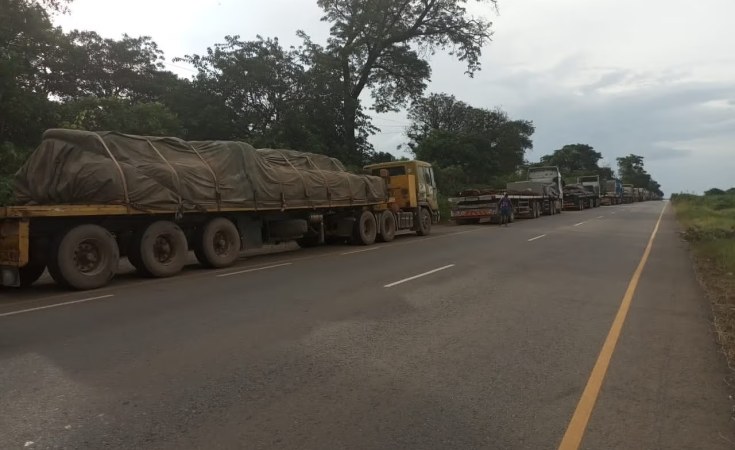Chililabombwe, Zambia — The presidents of the Democratic Republic of Congo and Zambia have vowed to resolve customs delays for trucks transporting copper from the two top producers in Africa. The growing demand for electric vehicles has fueled a race for the copper and cobalt used in their batteries, but truckloads of the key metals have been stuck at the border.
Angry truck drivers call for customs to speed up clearances at the border after a meeting this month among officials from the Democratic Republic of Congo and Zambia.
Some of the drivers, from southern and eastern Africa, have been parked in a kilometers-long line at the border for weeks.
They're waiting to deliver goods into the DRC or to take valuable metals out.
Driver Ediwn Kalaba is hauling copper to South Africa for export but has been stuck at the border for more than a week, sleeping in his truck.
He said it's dangerous because thieves can break in or steal fuel or parts from their trucks.
"We are being robbed or attacked every now and then, more especially on the diesel issue and battery. Goods are not safe. No toilets; just a bush," said Kalaba.
Peter Mumba is president of the United Truck Drivers and Allied Workers Union of Zambia.
He said the government needs to address the situation at the border urgently.
"The life of a truck driver, it has become so difficult ... because just one journey or one trip from South Africa, even Tanzania, to go into DRC takes someone even maybe more than a month for him to return home," said Mumba.
Zambian President Hakainde Hichilema and DRC President Felix Tshisekedi discussed the border problem Saturday on the sidelines of an African Union summit in Addis Ababa, Ethiopia.
Zambian media quote Hichilema saying Tshisekedi agreed to deal with the issue.
Zambia's transport and logistics minister, Frank Tayali, told VOA they will not tolerate any further delays. He blamed poor customs services on both sides.
"This impacts directly on government 's ability to collect revenue, which is so needed for the many things that we've lined up as a government to try and put this economy back on track. We are giving officers here six days to bring the situation back to normal before heads start to roll," he said.
Zambia in 2021 became the first African country in the COVID era to default on its debt and has since been negotiating with creditors.
The DRC is also suffering from the border congestion, says its vice consul, Nkulu Ndala, in Ndola, Zambia.
He estimates both Zambia and the DRC are losing more than half a million dollars per month from the border delays.
"Our economy goes down in Congo. It is a serious issue that needs to be resolved very soon between Zambia and Congo through our bilateral relations," he said.
Ndala said the DRC produced 2.2 million metric tons of copper last year.
Zambia's Chamber of Mines says the country produced a little more than one-third of that amount.
Zambia and the DRC produce 80 percent of the world's copper and two-thirds of its cobalt - vital components of electric vehicles that are seeing a jump in global demand.
Mining expert John Musonda from Zambia's Copperbelt University said developing the railway system could ease the problem.
"The railway systems which were created to get copper to the coast are dilapidated with trains moving at less than 35 kilometers an hour. This has seen bulk cargo spilling over on to the roads, we have seen more investment in the road sector, but these roads are not lasting they get damaged day in, day out despite billions of dollars being spent on these roads because bulk cargo is not designed to be moved on these fragile roads."
The DRC and Zambia last year agreed to open the border posts 24 hours a day to allow for faster processing.
But drivers say, so far, customs officers are only working 10 hours a day.


